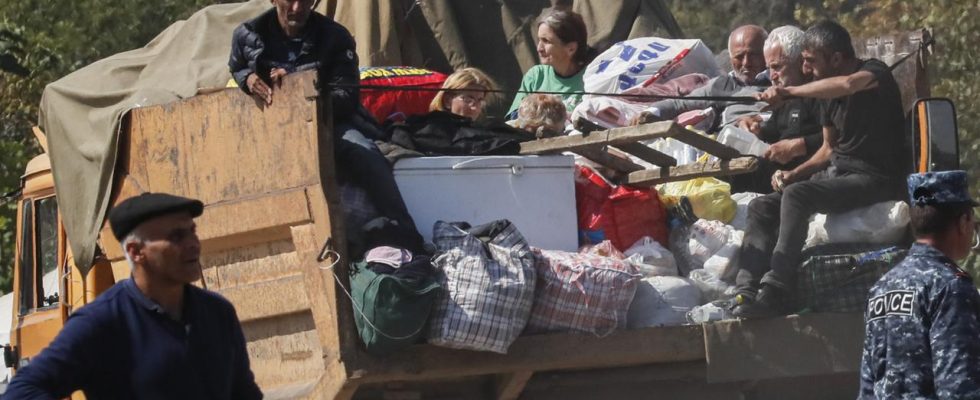After Azerbaijan’s military offensive, almost 100,000 Armenians have now left their home in Nagorno-Karabakh. Meanwhile, UN Secretary-General Guterres announced a UN mission.
The mass exodus of Armenian residents of Nagorno-Karabakh continues unabated: As the Russian news agency Interfax reported, according to figures from the Armenian government, 99,000 people from the Caucasus region had arrived in Armenia by Friday.
According to the AFP news agency, numerous people arrived in the Armenian border town of Goris. According to the latest information from the government in Yerevan, more than 80 percent of the 120,000 Armenian residents of Nagorno-Karabakh have now left the region.
On September 19, Azerbaijan launched a large-scale military offensive in the region. The pro-Armenian fighters there declared their surrender just one day ago. On Thursday, the dissolution of the self-proclaimed Republic of Nagorno-Karabakh was announced on January 1, 2024. Nagorno-Karabakh, which was predominantly inhabited by Armenians, would “cease to exist,” a decree said.
Death toll rises after explosion
Meanwhile, the death toll from the explosion at a fuel depot in Nagorno-Karabakh rose to at least 170 people, according to police. According to the authorities of the self-proclaimed republic, the number of injured is 349. The cause of the accident remained unclear. After the Azerbaijani military offensive in Nagorno-Karabakh, many people stocked up on gasoline at the fuel depot for their escape to Armenia.
Meanwhile, Stéphane Dujarric, spokesman for UN Secretary-General António Guterres, announced a UN mission in Nagorno-Karabakh. The ten-person team, led by staff from the UN Office for Humanitarian Affairs, will begin as early as the weekend “trying to assess the situation on the ground and identify humanitarian needs, both for those who are staying and for those who are flee”.
In view of the “catastrophic humanitarian situation” on site, the International Federation of Red Cross and Red Crescent Societies (IFRC) asked for support of around 20 million euros. Hospitals are at the end of their resources, and accommodation is “urgently” needed given the onset of cold weather, explained the IFRC Regional Director for Europe, Birgitte Bischoff Ebbesen.
Fear of further attacks by Azerbaijan
The Armenian ambassador to Germany, Viktor Yengibaryan, also fears an attack by Azerbaijan on the neighboring country of Armenia itself after the conquest of Nagorno-Karabakh. “We hear a lot of aggressiveness, threats and hate speech from Baku, not only against Nagorno-Karabakh but also against the Republic of Armenia,” Yengibaryan told the editorial network Germany (RND).
The chairman of the Foreign Affairs Committee in the Bundestag, Michael Roth (SPD), also fears that Azerbaijan could attack Armenia next. “We have to expect that Azerbaijani President Ilham Aliyev will once again try to create facts militarily. We are dealing with an authoritarian ruler who does not want to waste time at the negotiating table,” he told the “Tagesspiegel”.
Armenia is “militarily completely inferior.” He criticized the EU’s lack of support for Armenia. Roth calls for visa liberalization, aid, a peace process moderated by the EU and sanctions against Azerbaijan.
Nagorno-Karabakh conflict
Nagorno-Karabakh belongs to Azerbaijan under international law, but so far the majority of ethnic Armenians have lived there. The region declared independence in 1991 after a referendum that was not internationally recognized and boycotted by the Azerbaijani minority.
Azerbaijan and Armenia have been fighting over the region since the collapse of the Soviet Union and have therefore fought two wars, most recently in 2020. At that time, after six weeks of fighting with more than 6,500 deaths, Russia, which had long been an ally of Armenia, brokered a ceasefire agreement that forced Armenia to give up large areas.

